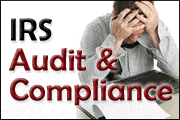IRA Audit and Compliance

Webinar: ID# 1000737
Course Summary:
If you do not want your financial institution writing checks to the IRS for filing errors, this webinar should be a true necessity!
Course Details:
Now it's time to check everything we - and those who came before us - have done to the IRA files. Increased IRS Penalties for Incorrect IRA Reporting to the IRS!! The IRS is losing patience - especially with financial institutions who do not complete the IRA 1099-R and 5498 IRS forms correctly. The Treasury Inspector General for Tax Administration (TIGTA) estimates over a million dollars in additional taxes could be collected on IRA distributions that have not been taken.
When the IRS actually contacted IRA accountholders who were noncompliant in taking their RMDs in 2011-2012, they discovered almost 16% indicated the information on their 5498 from their IRA custodian/trustee was incorrect. Do you know what that means?
The IRS is increasing penalties to the financial institutions if they file incorrect 1099-R and 5498 reporting. If you do not want your financial institution writing checks to the IRS for filing errors, this Webinar should be a true necessity!!
In the last part of this four-part series, we will discuss how to clean out those paper folders and what to scan in if you have electronic imaging. You will be provided with a list of the most common errors to look for as well as come IRA Audit Worksheets to help expedite your audit.
What You'll Learn:- What are the IRA accountholder notices that must be sent out in a timely manner
- How to audit the IRA department as far as expertise, form use, procedures and work flow
- Line by line instructions on 5498 and 1099-R reporting - what's required vs. what's optional.
- How and when to correct IRS reporting to avoid increased IRS fines to the financial institution
- The most common errors hiding in your IRA customer files
- Forms and tools for auditing your IRA files
- 2020 IRA Cost of Living Adjustments
Who Should Attend:This is very important for those who answer examiners questions and have to do corrective IRS reporting attend - including IRA personnel in New Accounts, CDs, Trust, and Investments, and auditors who are involved with the operation, administration or internal auditing of IRA accounts will benefit greatly from the thorough discussions of the file and reporting requirements. The content is at the intermediate to advanced level with a minimum of two years' experience recommended. It is assumed that participants have a working knowledge of IRAs.
Top FAQs
Auditors examine financial records and statements to determine the validity of information, and to check for fraud. They also ensure that individuals, companies, and government agencies are compliant with tax laws.
Among other things, an auditor helps an organization ensure that its financial records are accurate, applicable laws are followed, and taxes are paid properly and timely.
An audit is a systematic and independent examination of books, accounts, statutory records, documents and vouchers of an organization to verify the financial statements and non-financial disclosures. An audit can apply to an entire organization or might be specific to a function, process, or production step, and might include an on-site verification, such as inspection or examination.
Types of audits include internal, external, forensic, public, tax, and information systems. Internal auditors typically examine issues related to company business practices and risks.
Continuing Education Credits:
Click the 'Credits' tab above for information on PHR/SPHR, PDCs, and other CE credits offered by taking this course.


